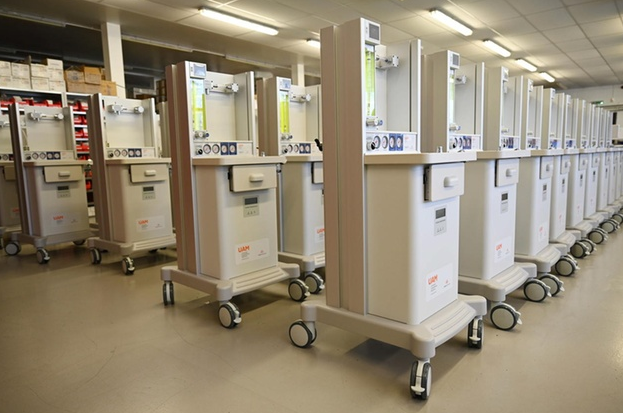
Medical ventilators constructed at the OES medical supply company in Britain, 23 March 2020. The British government has also asked top engineering companies to retool their production to make ventilators. (Keystone / Neil Hall)
Around 50 countries have introduced curbs on exports of medical supplies, including ventilators. This poses a major risk for poor countries, a Swiss study has revealed.
The past fortnight has seen nations around the world scrambling for medical supplies and equipment to combat the fast-spreading coronavirus. A growing number of governments have adopted measures to curb exports of such material to ensure adequate national supplies.
As of March 21, 46 export curbs on medical supplies have been introduced by 54 governments since the beginning of the year. Thirty-three of those export curbs have been announced since the beginning of this month, a trade policy report external linkby the University of St Gallen shows.
Ventilators are of particular concern, said study author Simon J. Everett. These are essential instruments for the care of people with lung failure, which can be one of the complications suffered by patients with severe Covid-19.
Currently, out of the 25 nations that export medical ventilators, only one is from Latin America, while there are none in Africa, Central Asia, the Middle East and South Asia. It is unlikely that local manufacturers in these countries will be able to step in to meet demand.
“As several of the exporters of medical ventilators are members of the European Union, where an export authorisation-cum-ban is now in effect, then half of the producers of ventilators are already beyond reach of buyers in emerging markets,” Everett warned.
“Working together, governments could quickly and cheaply implement a tariff-and-aid initiative that sweeps away the barriers which impede medical supplies reaching locations where there are desperately needed.”
Difficult decisions
The global ventilators market is worth more than $1 billion (CHF975 million) annually, according to Swiss-based Hamilton Medical, which says it has roughly a quarter share of revenue. Other major ventilator makers include US-based ResMed, Getinge of Sweden, Germany’s Draegerwerk and China’s Beijing Aeonmed.
One of the world’s largest makers of ventilators, Hamilton Medical expects to increase production to about 21,000 ventilators this year, up from 15,000 last year by deploying marketing staff on the production line, among other measures. But with many more orders than it can fulfil, the company faces difficult decisions on where to send them.
In Switzerland, the pressure on the health system is growing. Hospitals in Switzerland have to report how many emergency beds are available. In Switzerland there are 82 intensive care units, which have a total of 950-1,000 beds; around 850 of the beds are equipped with ventilators. The army has around 100 additional ventilators and has put in an order for 900 more.
Full story here Are you the author? Previous post See more for Next postTags: Health,newsletter































